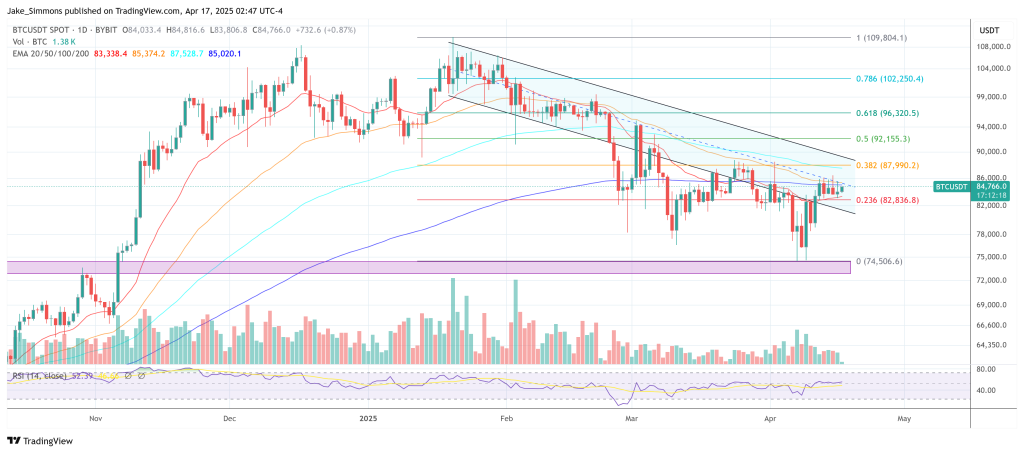Cause to belief
Strict editorial coverage that focuses on accuracy, relevance, and impartiality
Created by trade specialists and meticulously reviewed
The best requirements in reporting and publishing
Strict editorial coverage that focuses on accuracy, relevance, and impartiality
Morbi pretium leo et nisl aliquam mollis. Quisque arcu lorem, ultricies quis pellentesque nec, ullamcorper eu odio.
Este artículo también está disponible en español.
Bitcoin could also be trapped beneath the gravitational pull of compelled deleveraging, however macro strategist and Ahead Steerage host Felix Jauvin insists that the clearing of threat books is not more than “the prelude to an unbelievable commerce as soon as the degrossing is over.” In a thread on X, Jauvin stitches collectively fiscal arithmetic, international liquidity metrics and the geopolitics of commerce to argue that the following nice impulse for BTC will arrive when capital flows which have underpinned US asset dominance reverse and re‑seed threat urge for food overseas.
Bitcoin Amid The Trump Chaos
Jauvin begins by borrowing the empirical spine of Michael Howell’s work. “Bitcoin is primarily pushed by international liquidity,” he writes, citing Howell’s Granger‑causality exams that give liquidity an eleven‑week statistical lead on spot costs. Fairness‑model beta “is a spurious correlation,” Jauvin argues, as a result of US equities have merely been the channel by way of which international greenback liquidity has expressed itself since pandemic‑period deficits swelled Treasury issuance and family incomes without delay.
Placing numbers to the declare, he notes that the USA has “run a considerably larger fiscal deficit as % of GDP than another nation,” a niche that “mechanically results in larger inflation, larger nominal GDP, and subsequently larger prime‑line income for firms.” By extension, the S&P 500—and more and more Bitcoin—have monopolised incremental threat capital. “Due to this dynamic, US fairness markets have been the dominant marginal driver of dangerous asset development, wealth impact, international liquidity, and subsequently a vacuum for international capital to go the place it’s handled finest: the USA.”
Associated Studying
Jauvin’s inflection level is the Trump marketing campaign’s declared ambition to compress the commerce deficit and prod allies into heavier fiscal outlays for defence and infrastructure. “The Trump administration needs to decrease commerce deficits with different international locations, which mechanically implies a lower of US {dollars} flowing to international international locations that won’t be reinvested into US property,” he writes. A paired goal is “a weaker greenback and stronger foreign currency,” achieved as international central banks raise charges and buyers repatriate funds to reap that carry.
He sees the genie already inching out of the bottle: “Trump’s shoot‑first, ask‑questions‑after strategy to commerce negotiations is main the remainder of the world to unshackle themselves from their meagre fiscal deficits … I consider nations will proceed with this pursuit regardless.”
If international governments embark on deficit‑financed rearmament and industrial coverage, the marginal development in international liquidity would migrate out of Washington and into Europe and Asia. “Because the US continues to pivot from a worldwide capital accomplice to a extra protectionist one, holders of US‑greenback property will start to have to extend the danger premium related to these beforehand pristine property and need to mark them with a wider margin of security.”
Why Bitcoin, And Why After The Promote‑Off
Jauvin frames the current turmoil as the required purgation of crowded positions: “The primary commerce is to promote US‑greenback property that the whole world is chubby and keep away from the degrossing that’s ongoing.” Margin exhaustion forces funds to lift money indiscriminately, pinning Bitcoin to tech beta for now. However, he insists, the second section will favour property unburdened by nationwide accounts or tariff threat. “Throughout rotational market days and non‑margin‑name days, we’ve began to see this dynamic take form. DXY down, US equities underperforming ROW, gold hovering, and Bitcoin holding up surprisingly nicely.”
Associated Studying
Gold has already responded, he notes. Bitcoin, in contrast, “hasn’t saved up with gold’s outperformance” as a result of its excessive‑beta repute retains systematic merchants on the sidelines. That units up the asymmetry: “For me, a threat‑in search of macro dealer, Bitcoin feels just like the cleanest commerce after the commerce right here. You’ll be able to’t tariff bitcoin, it doesn’t care about what border it resides in … and gives a clear publicity to international liquidity, not simply American liquidity.”
Crucially, Jauvin anticipates a visual break within the co‑motion with US tech as soon as non‑US fiscal stimulus turns into the main supply of incremental liquidity. “I’m seeing the potential for the primary time … for Bitcoin to decouple from US tech equities,” he writes, conceding that the concept has harm many earlier than however arguing that this time “we’re seeing the potential for a significant change in capital flows that might make it sturdy.”
If the thread’s logic holds, the current stress is the necessary downstroke earlier than a secular re‑ranking. “This market regime is what Bitcoin was constructed for,” Jauvin concludes. “As soon as the degrossing mud settles, it is going to be the quickest horse out of the gate. Speed up.”
At press time, BTC traded at $84,766.

Featured picture created with DALL.E, chart from TradingView.com










